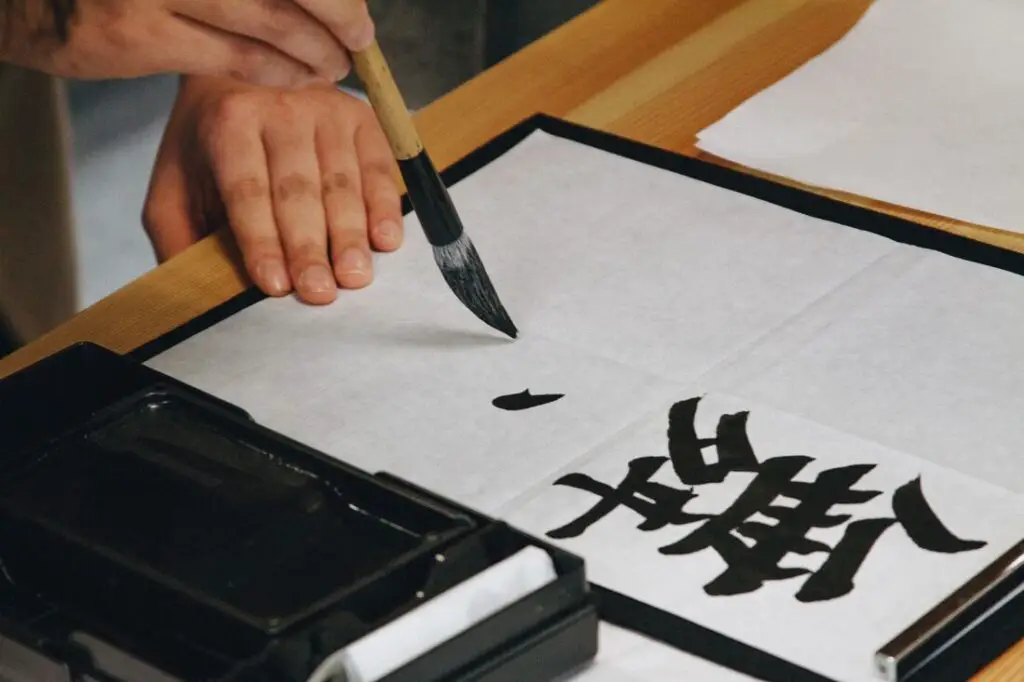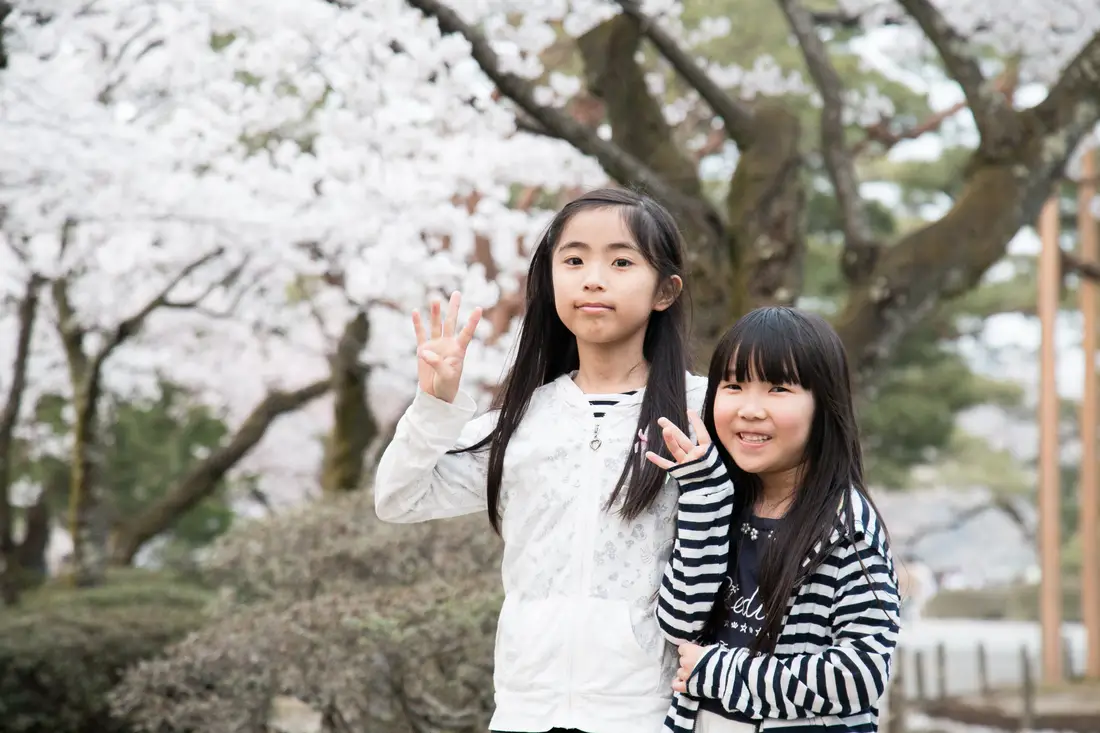Looking for Japanese girl names? Here you’ll find 44 ideas for cute, strong, ancient, popular, and rare Japanese girl names.
Japanese culture is rich in traditions, symbolism, and profound meanings, which is reflected in Japanese names as well.
Choosing a name is one of the first gifts parents give to their children, and in Japan, this choice is taken very seriously.
Japanese girl names are not only melodious but also carry a cultural richness and a fascinating history.
Let’s explore some of the most popular girl names in Japan and discover their enchanting and surprising meanings.
If you’re looking for ideas for Japanese boy names, read this post.
Cute Japanese Girl Names
Just as Japanese culture is full of elegance and delicacy, there are many cute Japanese girl names that carry meanings or sounds that are sweet to hear.
- Sakura (さくら): This name means “cherry blossom” in Japanese, evoking the beauty of cherry blossoms.
- Hana (はな): Meaning “flower,” it’s a short and lovely name.
- Aoi (あおい): Aoi means “blue.” It’s a soft and elegant name.
- Yuki (ゆき): Yuki means “snow.” It’s a sweet and popular name in various cultures.
- Momo (もも): Meaning “peach,” Momo is a charming and easy-to-pronounce name.
- Yui (ゆい): A short name meaning “connection” or “union,” conveying a feeling of connection.
- Riko (りこ): Riko means “child of truth.” It’s a cute and meaningful name.
- Sora (そら): Meaning “sky,” a name that evokes serenity and beauty.
- Miu (みう): A short and sweet name with no specific meaning, but very popular in Japan.
- Nina (にな): While not strictly Japanese, Nina is a name that is easily recognized in Japan and many other parts of the world. It’s simple and adorable.
- Koko (ここ): Meaning “here,” this name is short, easy to remember, and has a touch of cuteness.
- Emi (えみ): Emi means “smiling” or “blessed with beauty.” It’s a name that evokes joy and happiness.
Strong Japanese Girl Names
If you’re thinking of giving your daughter a name that conveys strength and attitude, here are some ideas.
- Aiko (愛子): Meaning “beloved daughter” or “love,” it represents a strong emotional connection and affection.
- Reika (麗香): Meaning “beautiful fragrance,” this name conveys a sense of beauty and elegance.
- Yūki (勇気): Meaning “courage,” it’s a name that represents strength and bravery.
- Shiori (栞): Meaning “guide” or “lead,” this name conveys a sense of leadership and guidance.
- Takara (宝): Meaning “treasure,” it represents something of great value, something strong and precious.
- Sakura (咲良): While the basic meaning is “cherry blossom,” it can also symbolize the ephemeral beauty and strength in the transience of life.
- Emiko (笑美子): Meaning “smiling and beautiful child,” it represents the strength found in positivity and smiles.
- Tomoe (巴): Meaning “spiral” or “understanding,” this name is used as a symbol of courage and protection in ancient Japanese cultures.
- Satsuki (皐月): Referring to the month of May in the Japanese lunar calendar, it represents renewed energy and strength in spring.
- Kiyomi (清美): Meaning “pure beauty,” this name represents the strength found in purity and clarity.
- Ryoko (涼子): Meaning “refreshing daughter,” this name conveys a sense of freshness and calmness, even in difficult situations.
- Haruka (遥): Meaning “distant” or “far,” it represents inner strength to face challenges and overcome obstacles.
- Akemi (明美): Meaning “bright beauty” or “beautiful brightness.”
Ancient Japanese Girl Names
Japan is a country that carries many histories and traditions, just like the names on this list.
- Emiko (笑美子): Meaning “smiling and beautiful child,” this name has a long history in Japan and represents beauty and joy.
- Masako (雅子): Meaning “elegant child,” it’s a classic name representing grace and elegance.
- Chizuru (千鶴): Meaning “thousand cranes.” Cranes are symbolic birds in Japan, representing courage and tenacity.
- Eiko (栄子): Meaning “blessed child,” it’s a traditional name symbolizing prosperity and blessings.
- Kiyoko (清子): Meaning “pure child,” this name represents purity and innocence.
- Yoshiko (良子): Meaning “good child,” it’s a name that emphasizes positive and virtuous qualities.
- Haruko (春子): Meaning “child of spring,” it’s a name that celebrates renewal and blossoming of spring.
- Sumiko (澄子): Meaning “daughter of clarity.”
- Fumiko (文子): Meaning “cultured child,” it’s a name representing knowledge and wisdom.
- Natsuko (夏子): Meaning “child of summer,” it’s a name that evokes the energy and vitality of summer.
- Toshiko (年子): Meaning “child of the year,” it’s a name that has a connection with the annual cycle and represents renewal.
- Isako (勇子): Meaning “brave child,” it’s a name that emphasizes courage and inner strength.
Popular or Trendy Names
The top ten most popular names in Japan in 2022-2023, according to a survey conducted by the Japanese company Service Media.
- Himari (陽葵): Meaning full of energy (like the sun)
- Rin (凛): Meaning strong, dignified, elegant
- Yuina (結菜): Meaning full of energy, someone who connects people.
- Mei(芽依): Meaning person with strong principles, challenging
- Uta (詩): Meaning sensitive and expressive
- Hina (陽菜): Meaning calm, gentle, warm, and sincere
- Aoi (葵): Meaning beautiful, sincere, honest, and strong. It’s a gender-neutral name option.
- Riko (莉子): Meaning logical, calm person
- Tsumugi (紬): Meaning connected, full of dreams, connected with people
- Ema (咲茉): Meaning creative, strong, and elegant
Rare Japanese Girl Names

The “Kira Kira names” are quite unique names, different from the traditional ones.
Some examples show how they are quite creative and deviate from the common ones.
Names like Pikachu, Naruto, or Ariel, based on famous anime characters or some animation famous worldwide. Tetris, the name of a classic video game. Or names of drinks like Mocha or Cocoa.
Japanese Girl Names from A to Z
To facilitate your search, here are the names ordered alphabetically.
Names from A to H
- Aiko (愛子): Meaning “beloved daughter” or “love,” it represents a strong emotional connection and affection.
- Akemi (明美): Meaning luminous beauty or beautiful brightness.
- Aoi (あおい): Aoi means “blue.” It’s a soft and elegant name.
- Chizuru (千鶴): Meaning “thousand cranes.” Cranes are symbolic birds in Japan, representing courage and tenacity.
- Eiko (栄子): Meaning “blessed child,” it’s a traditional name symbolizing prosperity and blessings.
- Ema (咲茉): Meaning creative, strong, and elegant
- Emi (えみ): Emi means “smiling” or “blessed with beauty.” It’s a name that evokes joy and happiness.
- Emiko (笑美子): Meaning “smiling and beautiful child,” this name has a long history in Japan and represents the beauty and joy.
- Fumiko (文子): Meaning “cultured child,” it’s a name representing knowledge and wisdom.
- Hana (はな): Meaning “flower,” it’s a short and lovely name.
- Haruka (遥): Meaning “distant” or “far,” it represents inner strength to face challenges and overcome obstacles.
- Haruko (春子): Meaning “child of spring,” it’s a name that celebrates renewal and blossoming of spring.
- Himari (陽葵): Meaning energetic (like the sun)
- Hina (陽菜): Meaning calm, gentle, warm, and sincere
Names from I to N
- Isako (勇子): Meaning “brave child,” it’s a name that emphasizes courage and inner strength.
- Kiyoko (清子): Meaning “pure child,” this name represents purity and innocence.
- Kiyomi (清美): Meaning “pure beauty,” this name represents the strength found in purity and clarity.
- Koko (ここ): Meaning “here,” this name is short, easy to remember, and has a touch of cuteness.
- Masako (雅子): Meaning “elegant child,” it’s a classic name representing grace and elegance.
- Mei(芽依): Meaning person with strong principles, challenging
- Miu (みう): A short and sweet name with no specific meaning, but very popular in Japan.
- Momo (もも): Meaning “peach,” Momo is a charming and easy-to-pronounce name.
- Natsuko (夏子): Meaning “child of summer,” it’s a name that evokes the energy and vitality of summer.
- Nina (にな): While not strictly Japanese, Nina is a name that is easily recognized in Japan and many other parts of the world. It’s simple and adorable.
Names from R to Z
- Reika (麗香): Meaning “beautiful fragrance,” this name conveys a sense of beauty and elegance.
- Riko (りこ): Riko means “child of truth” or “truthful child.” It’s a cute and meaningful name.
- Rin (凛): Meaning strong, dignified, elegant
- Ryoko (涼子): Meaning “refreshing daughter,” this name conveys a sense of freshness and calmness, even in difficult situations.
- Sakura (さくら): This name means “cherry blossom” in Japanese, evoking the beauty of cherry blossoms.
- Satsuki (皐月): Referring to the month of May in the Japanese lunar calendar, it represents renewed energy and strength in spring.
- Shiori (栞): Meaning “guide” or “lead,” this name conveys a sense of leadership and guidance.
- Sora (そら): Meaning “sky,” a name that evokes serenity and beauty.
- Sumiko (澄子): Meaning “daughter of clarity.”
- Takara (宝): Meaning “treasure,” it represents something of great value, something strong and precious.
- Tomoe (巴): Meaning “spiral” or “understanding,” this name is used as a symbol of courage and protection in ancient Japanese cultures.
- Toshiko (年子): Meaning “child of the year,” it’s a name that has a connection with the annual cycle and represents renewal.
- Tsumugi (紬): Meaning connected, full of dreams, connected with people
- Uta (詩): Meaning sensitive and expressive
- Yoshiko (良子): Meaning “good child,” it’s a name that emphasizes positive and virtuous qualities.
- Yui (ゆい): A short name meaning “connection” or “union,” conveying a feeling of connection.
- Yuina (結菜): Meaning energetic, someone who connects people.
- Yuki (ゆき): Yuki means “snow.” It’s a sweet and popular name in various cultures.
Structure of Japanese Names

In Japan, the surname (family name) is written first and the given name (given by the parents) is written last.
There are two different writing systems: Kanji, which is influenced by the Chinese alphabet, and Kana, which is composed of the alphabets Hiragana and Katakana.
Kanji: Most Japanese names are written in Kanji. What’s interesting about the name in Kanji is that despite the sound of the word being the same, it can have unique meanings and different writing forms.
For example:
Yoshi can be written in three ways: 吉 (good luck), 義 (just), and 良 (virtuous).
Katakana: It’s typically used when the person’s name is of foreign origin. Using this structure helps with the correct pronunciation of names.
Common Japanese Surnames in Japan
The most common Japanese surnames in Japan are: Sato, Suzuki, Takahashi, Tanaka, Ito, Watanabe, Yamamoto, Kobayashi, and Kato.





